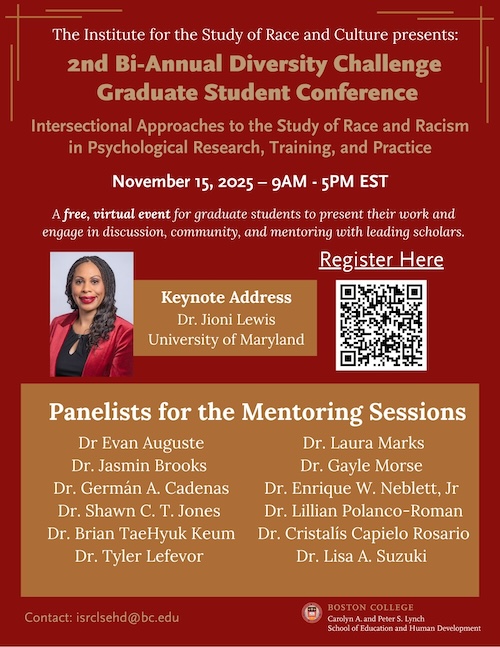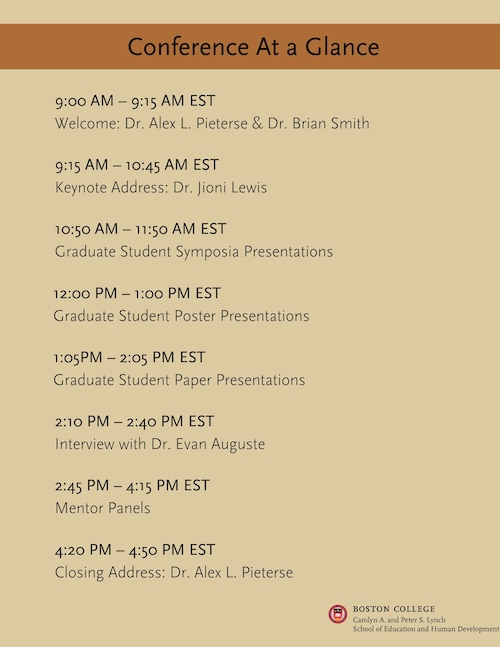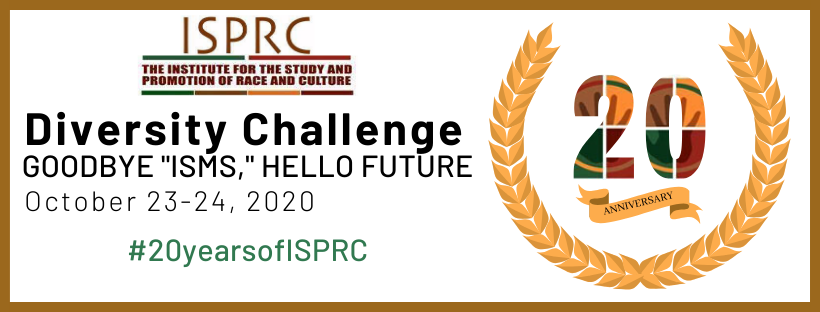Diversity Challenge
The Institute was founded in 2000 at Boston College, to promote the assets and address the societal conflicts associated with race and culture in theory and research, mental health practice, education, business, and society at large. Each year the Institute addresses a racial or cultural issue that could benefit from a pragmatic, scholarly, or grassroots focus through its Diversity Challenge conference.
The 2025 Diversity Challenge will center graduate students and it will be virtual. The theme is "Intersectional Approaches to the Study of Race and Racism: Implications for Psychological Research, Training, and Practice."
2025 Biennial Diversity Challenge Graduate Student Conference:
Intersectional Approaches to the Study of Race and Racism: Implications for Psychological Research, Training, and Practice
Saturday, November 15, 2025 | 9 a.m. - 5 p.m. EST
How race and racism intersect with other aspects of personal identity and societal oppression is an important area of inquiry for psychology. As such, this year's Diversity Challenge Graduate Student Conference will allow conference participants the opportunity to present and engage with conference speakers on a range of topics that reflect the intersectional nature of race and racism.
Headlined by Keynote Speaker Dr. Jioni Lewis, this virtual conference will provide students the space to share research theorizing on intersectionality and recommendations for practice and policy that reflect intersections of race and racism with gender, disability, social class, sexual identity, and religion. In addition, the mentoring panels will allow students to connect with scholars in the field to discuss the navigation of race and racism in an increasingly intolerant environment.

Schedule of Events

“ As a result of attending the conference, my thinking about the ways gender, race and ethnic identity develop among women and girls and its psychological outcomes has deepened in complexity and understanding. ”
Past Events
Toward an Anti-Racist Psychological Science: Epistemic and Methodological Considerations
September 13 & 14, 2024
Boston College
The 2024 Diversity Challenge Conference explored approaches to dismantling the dominance of Whiteness in psychological science, as well as elevating additional racial and cultural perspectives on psychological constructs and research methodologies. The conference was held in-person at Boston College.
Race and Racism in Psychological Science: Considerations for Emerging Scholars
November 11, 2023
Online via Zoom
This opportunity focused on showcasing the work of Graduate students as they presented their work and received valuable mentorship from esteemed scholars in this field. Attendees contributed to the production and dissemination of impactful research on race and racism. This conference was free and open to graduate students.
The 2022 Diversity Challenge focused on strategies and interventions designed to facilitate healing from racial trauma and will address racial trauma from multiple perspectives. Presentations focused on multigenerational trauma, healing through storytelling, utilization of research as a tool for empowerment and liberation, understanding the effects of racial trauma on academic performance, and surviving and thriving in the midst of ongoing racially traumatic experiences. The conference welcomed nationally recognized experts sharing their perspectives, insights, and research, and heard from graduate students during the poster presentation session.
Events over the past years have highlighted the ongoing and urgent need to address the harmful effects of racism and to be more vigilant in our efforts focused on both intervening and preventing the traumatic effects of race and racism.
The 20th anniversary of ISPRC and Diversity Challenge theme was “Goodbye ‘Isms,’ Hello Future.” Racism, racialized ethnocentricity, and xenophobia have spread their tentacles of oppression in virtually every domain in U.S. society as well as other countries. Over the years, communities of Diversity Challengers have convened to share their scholarship, mental health interventions, educational strategies, social justice community advocacy, or their encouragement to foster our shared efforts to move toward a mutual goal of ending racial and ethnic cultural oppression in whatever forms they occur.

Diversity Challenge 2017 - A Look Back
The ISPRC wishes to extend our gratitude to all presenters and participants who attended the 2017 Diversity Challenge: "Race, Culture, and Criminal Justice throughout the Lifespan." Over 100 presentations, including Invited Panels, Workshops, Symposia, Individual Presentations and Posters, helped to bring together scholars, educators, mental health practitioners and others to share ideas, research, and conversation about this important and timely topic. Below are some images from the two-day interactive conference.
Theme History
2001 How to Survive Teaching Courses on Race and Culture
2002 How to Keep High-Stakes Tests from Making People Mentally Ill
2003 30+ Years of Racial Identity Theory: What Do We Know? And How Does It Help Us
2004 Making Race and Culture Matter in Community-Focused Interventions
2005 Making Race and Culture Work in the World of Work
2006 Do Immigrants Catch or Carry Race and Culture
2007 Race and Culture Intersections in Scientific Research and Mental Health Service Delivery for Children, Adolescents, and Families
2008 Race, Culture, and Trauma
2009 Racial Identity and Cultural Factors in Treatment, Research, and Policy
2010 Race and Culture in Teaching, Training, and Supervision
2011 Intersections of Race or Ethnic Culture with Gender or Sexual Orientation
2012 What to Do about Race and Culture and Violence
2013 Intersections of Race, Culture, and Health and Mental Health
2014 Racial or Ethnic Discrimination Across the Lifespan
2015 Race, Culture, and Social Justice
2016 Race, Culture, and Educating our Youths: Developing People Not Widgets

